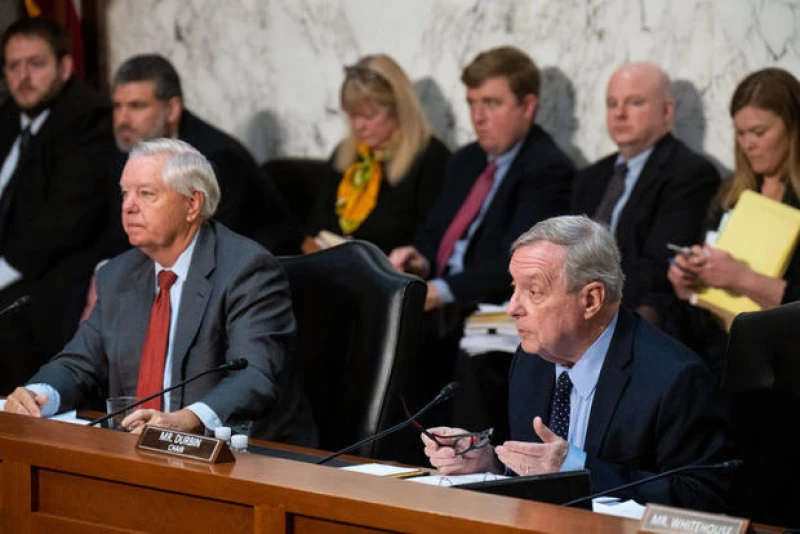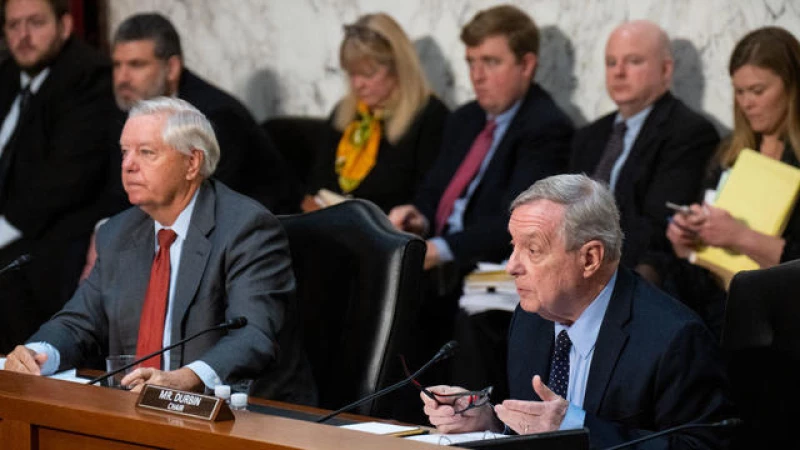Washington — Democrats on the Senate Judiciary Committee voted to issue subpoenas to GOP megadonor Harlan Crow and conservative judicial activist Leonard Leo on Thursday, marking a new front in the panel's investigation into the ethics practices at the Supreme Court.
The subpoenas were approved following a contentious meeting in which Republicans accused their Democratic colleagues of attempting to undermine the Supreme Court by targeting private citizens. The committee's GOP members walked out of the room while the vote took place, with only Sen. Lindsey Graham, the panel's top Republican, remaining. All 11 Democrats voted to authorize the subpoenas.
Lawmakers are seeking documents from Crow and Leo about gifts, trips and lodging provided to any member of the high court. Their involvement in luxury trips provided to Justices Clarence Thomas and Samuel Alito.
"The attempts made by Congress to obstruct legitimate oversight should be a concern for all of us," stated Senate Judiciary Committee chairman Dick Durbin prior to the vote on the subpoenas. "I do not take this authorization lightly and I do not make this request often. However, in order to protect Congress' authority and further the committee's efforts to establish an enforceable code of conduct for the Supreme Court, it is necessary to seek authorization to pursue compulsory process against Mr. Leo and Mr. Crow."
Durbin referred to Crow and Leo as "key figures" in the ethical challenges faced by the Supreme Court.
Graham accused Democrats of attacking the court's integrity, especially since it now has a conservative majority of 6-3, following decisions on abortion, gun rights, and affirmative action. He claimed that the investigation involving Leo and Crow is "politically motivated" and could potentially lead senators to issue subpoenas against individuals they dislike.
"This is an ongoing effort to dismantle the court. To tarnish Clarence Thomas' reputation. To pack the court. To ensure that the current Supreme Court cannot function," Graham criticized the Democrats' actions.
Democrats on the committee had also initially planned to seek approval for a subpoena against a third Republican donor, Robin Arkley II. However, Durbin withdrew the request earlier this month after Arkley provided information to the committee.
Ethics at the Supreme Court

The Judiciary Committee began its investigation into the ethics policies at the Supreme Court this spring in response to a report from the investigative news outlet ProPublica. The report detailed trips that Justice Thomas took aboard Crow's private plane and yacht, as well as luxury vacations that the justice accepted from Crow over their 25-year friendship. Crow, a billionaire real estate developer, was the source of these gifts.
Justice Thomas did not disclose these travels on his annual financial disclosure forms. However, he stated in response to the revelations that he did not believe he was required to do so under exemptions for personal hospitality.
Crow offered to provide the Judiciary Committee with limited information, but Senate Democrats were not satisfied with the offer.
Republicans Defend Thomas and Alito, Accuse Democrats of Ignoring Ethics Concerns
Republicans have defended Justices Clarence Thomas and Samuel Alito, accusing Democrats of unfairly focusing on them while ignoring recent revelations from the Associated Press that Justice Sonia Sotomayor's court staff pushed public institutions to purchase her books. It was also revealed that Justice Sotomayor declined to recuse herself from copyright cases before the court that involved her book publisher. Justice Neil Gorsuch also did not step aside in a case involving the publisher of his 2019 book.
The focus on Thomas' ties to a wealthy donor, Harlan Crow, has put pressure on the Supreme Court to adopt a binding code of ethics. In response, the Judiciary Committee advanced legislation this summer that would require the Supreme Court to adopt an enforceable set of ethics rules. The court recently announced that it has adopted a formal code of conduct, although it does not include an enforcement mechanism.
Several justices, including Chief Justice John Roberts, have expressed support for a formal set of ethics policies. Chief Justice Roberts acknowledged in May that the court can do more to "adhere to the highest standards" of ethical conduct and stated that the justices are actively exploring ways to give practical effect to that commitment.
Justices Elena Kagan and Amy Coney Barrett have also expressed support for adopting a code of ethics, particularly as favorable opinions of the Supreme Court have fallen to historic lows.







